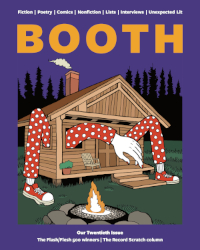He was standing in the death of the sun that is the evening and contemplating the storm that was about to hit when she turned to him and whispered that she was frightened for her wood floors under the deluge. He never stood in her way. They turned and went into the house. There, they fell into the things of a household, putting away the groceries and closing the windows against the coming rain and even beginning the chopping of vegetables that would presage a borscht, should they, as planned, be put into a pot and boiled judiciously. As the soup progressed and needed little-to-no human intercedence, she turned to him and asked that he speak to her softly. He nodded slowly and at first spoke not at all. Then, he opened up a book of Chekhov’s tales and began to read to her but in his fashion, so that the words came out his own and not in Chekhov’s world at all but in theirs.
He spoke of a cab driver sitting in a storm, much like this storm that beat a tattoo around the house where he and she lived, and this cab driver would sit in this torrential beating of the rain against his cab window and think not very far at all, not some great, imagined distance but only of the previous day, in which he had shuffled into the hospital room of his son. He had gotten precisely that far, just through the long, eerie, pale hallway of the hospital and finally through the door of the room, when his thoughts were interrupted by a mother and her adult daughter entering the cab, at which point the mother barked an address not a terrible distance, except for the rain, from where the cab driver was now parked, and duly, in the way of his profession, the cab driver engaged the meter and began to drive the distance.
He overheard the adult daughter refer to her mother as such—that is, she used the familiar term “Mom” and the mother engaged her daughter in conversation—and the cab driver waited until there was a lull, and he said, “So, you’re her mother?” What he had hoped would happen was that the mother would say ”Yes,” and the conversation would eventually proceed to whether the cab driver, being of an analogous age to that of the mother of the adult daughter, also had a child, adult or otherwise, and he would say, “Yes, I do. I did. I have a son, but he died yesterday.” In doing so, the cab driver would be able to complete his thought, to finally step through that hospital door and walk into that room where his son lay battered by the car wreck that had—he would know now, it would be real—had taken him from him. What the mother and daughter would do then, the cab driver would not venture to predict, but he assumed words of human sympathy would flow in, and in that moment, he would reach the end or perhaps the beginning of the immense grief that he would call the rest of his life.
But the mother of the adult daughter and, indeed, the adult daughter herself did not reply to the cab driver. He, telling the story to her, could only speculate that they did not hear the cab driver or, perhaps, believed him to be talking on the phone, as so many drivers in this day and age are often found to be doing that while driving their cabs. Instead of responding to him, they continued their own conversation with each other, and while the cab driver heard many remarks between the mother and her adult daughter, none were addressed to him, and there was no other lull in the conversation until the drive was over, at which point the two women paid what the meter said along with some additional money for a gratuity in cash and left the cab. The cab driver stared at the money for a long time, as the rain continued to bear down on him, and his own words continued to sit in his chest, the words, “I did have a son. He died yesterday,” remained in him, unspoken. Then, he threw the money out the window, laid his head against the wheel, and whispered the words, he whispered, “I did have a son. He died yesterday.” The whispering left a slight wet patch against the plastic-like faux leather of the steering wheel, and then his tears left a considerably larger wet spot.
That is the end of the story, he announced, and she responded not at all, for she had fallen asleep on the couch, and this was their way: He would read a story to her, and sometimes the story was sad and sometimes it was humorous and sometimes it was cruel, and she would fall asleep before the end. He would wake her with a kiss on her forehead, and they would eat dinner together without speaking of the story and then go to bed. In the morning, she would ask him how Chekhov had ended the story, and he would tell it to her, and she would say, “How strange. He would end with the wet spot on the steering wheel?” and he would say, “More or less, more or less, but, of course, it was a horse.”



